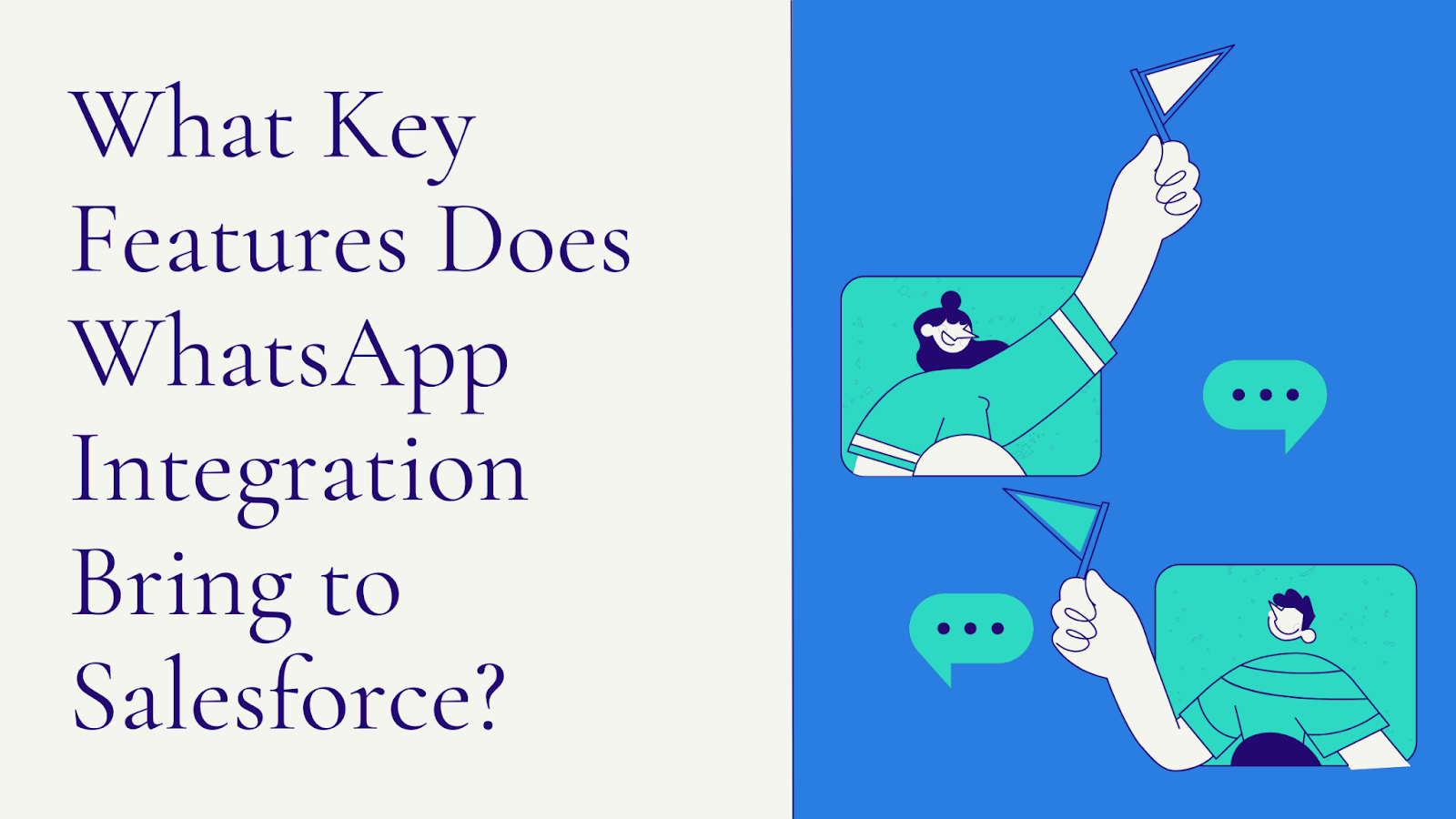In today’s fast-paced business world, effective communication is key to success. Integrating WhatsApp with Salesforce enhances CRM, bringing a new level of connectivity and boosting overall efficiency. Let’s explore the key features that make WhatsApp integration with Salesforce a game-changer for businesses of all sizes.
Integrating WhatsApp with Salesforce revolutionizes how businesses interact with customers by leveraging real-time messaging, streamlined sales processes, enhanced customer support, personalized engagement, and robust security measures. Real-time messaging capabilities allow for instant communication, enabling businesses to resolve issues quickly and efficiently. Streamlined sales processes benefit from automated lead management and tracking, ensuring consistent engagement with potential customers.
Enhanced Customer Communication
Enhanced customer support is achieved through AI-driven chatbots and seamless message logging, improving response times and satisfaction rates. Personalized engagement strategies become more effective with data-driven insights from customer interactions. Additionally, the integration ensures end-to-end encryption and compliance with industry regulations, safeguarding customer data. By utilizing WhatsApp integration Salesforce becomes a more powerful tool for driving customer satisfaction and business growth.
WhatsApp integration with Salesforce revolutionizes how businesses interact with their customers. Real-time messaging is a critical feature. This significantly boosts customer satisfaction and engagement with WhatsApp integration, businesses can now respond to customer inquiries instantly. This quick communication speeds up problem solving. It also improves service efficiency and builds better customer relationships. Sixty-six percent of online adults worldwide prefer messaging for business communication. This underscores the need to incorporate WhatsApp into customer service strategies. The same goes for similar platforms.
WhatsApp supports more than just text-based communication. It allows for rich multimedia communication, including images, videos, and documents. This feature enriches customer interactions by making explanations clearer and more engaging. Today’s WhatsApp conversations are dominated by images and videos. Users exchange over 100 billion of them every day. This visual revolution offers businesses a powerful tool to elevate customer interactions. By incorporating visually rich responses, companies can more effectively address customer queries. They can create engaging experiences. They will match modern consumers’ love of dynamic, image-based communication.
Streamlined Sales Processes
Adding WhatsApp improves communication. It also enhances the sales lifecycle in Salesforce. The integration streamlines lead capture and nurturing processes. It enables sales teams to follow up with potential customers automatically. They can set reminders for engagement and avoid losing leads due to delays. This ultimately improves sales outcomes.
Sales teams benefit from the ability to track customer interactions. They can also track customer progress within Salesforce. This provides a unified view of customer engagement. It helps sales strategies and improves decision-making. Given that 76% of customers expect consistent interactions, a unified approach is essential. It meets customer expectations and boosts sales efficiency. Having all customer communication history in one place helps. Sales representatives can deliver more personalized and informed service. This leads to higher customer satisfaction and more sales opportunities.
Improved Customer Support
Adding WhatsApp to Salesforce brings powerful tools. They enhance customer support. AI-driven chatbots work with WhatsApp. They can provide instant support, handle routine questions, and reduce wait times. These chatbots can handle most of the simple customer questions. They significantly enhance efficiency and customer satisfaction. Automating responses to common questions allows businesses to provide 24/7 support. It also frees up human agents to handle more complex issues.
WhatsApp messages are logged in Salesforce Service Cloud. It allows for smooth transition from automated to human agents when necessary. This seamless integration ensures efficient handling of complex issues. It also ensures thorough tracking of customer interactions. This integration is crucial for effectively managing many customer interactions. Centralizing all customer communications within Salesforce offers a comprehensive view of interactions. You see the history of each customer. This enables support teams to deliver more personalized assistance.
Personalized Customer Engagement
WhatsApp integration with Salesforce opens up new avenues for personalized customer engagement. Businesses can develop and utilize pre-approved message templates. These keep communication consistent, follow brand guidelines, and strengthen customer relationships. The templates ensure that every interaction matches the company’s voice and messaging strategy. They also allow for personalization based on customer needs.
The integration allows businesses to analyze communication patterns and customer preferences. This valuable data drives personalized marketing strategies. It enables tailored customer approaches and increases customer engagement. Businesses can craft better marketing campaigns and service strategies. They can do this by understanding customers’ preferred communication methods. They also need to understand which messages resonate with them. This shows that the platform’s personalized engagement works. This personalized approach enhances customer satisfaction. It also boosts loyalty and repeat business.
Security and Compliance
Data protection is paramount today. Integrating WhatsApp with Salesforce, offers robust security. WhatsApp has end-to-end encryption. It ensures secure channels. It protects customer data and follows data protection laws. This security level is crucial. It maintains customer trust and adheres to industry standards. Customers can feel confident. Their sensitive information is protected. This is especially important in industries with financial or personal data.
The integration helps businesses meet industry compliance rules. It keeps compliance records, aids audits, and ensures adherence to regulations. Following data protection rules like GDPR can prevent fines. This highlights the importance of secure and compliant communication systems. Integrating WhatsApp with Salesforce helps businesses. It lets them track and manage their communications. This ensures they meet legal and regulatory requirements. This allows businesses to provide efficient customer service while remaining compliant.
Integration and Customization
The WhatsApp integration with Salesforce is very flexible. It lets businesses tailor the solution to their needs. APIs (Application Programming Interfaces) and SDKs (Software Development Kits) facilitate seamless technical integration. The tools allow businesses to create smooth, efficient communication platforms. These platforms must align with operational needs.. A company may need to integrate WhatsApp into its workflow. Or, it may need to build custom apps around it. The integration’s flexibility makes both possible.
The integration also supports additional third-party apps and services. They offer added features. They offer flexible solutions to boost productivity. They can fit unique business needs. They show the big impact of custom integrations on business. This flexibility ensures that businesses of all sizes can effectively utilize WhatsApp. They can use it in various industries. They can use it in a way that best aligns with their goals
Comparison: WhatsApp Integration vs. Traditional CRM Communication
| Feature | WhatsApp Integration | Traditional CRM Communication |
| Response Time | Real-time | Often delayed |
| Multimedia Support | Rich (images, videos, docs) | Limited |
| Customer Preference | Preferred by 66% of online adults | Less preferred |
| Lead Increase | Up to 40% | Varies |
| AI Chatbot Efficiency | Handles up to 80% of inquiries | Limited or absent |
| Security | End-to-end encryption | Varies |
| Personalization | High | Moderate |
| Compliance | Built-in features | Often requires additional tools |
| Integration Flexibility | High (APIs, SDKs) | Varies |
| Customer Satisfaction Increase | Up to 20% | Varies |
Conclusion
Integrating WhatsApp with Salesforce brings a range of powerful features that can transform customer interactions. This integration offers a holistic solution for today’s businesses, enhancing communication, accelerating sales, improving customer support, and bolstering security. By leveraging these capabilities, businesses can anticipate significant gains in customer satisfaction, sales performance, and overall operational efficiency. As customer expectations continue to evolve, adopting integrated communication tools like WhatsApp in Salesforce will be essential for staying competitive and achieving long-term success
FAQs
Q: How does WhatsApp integration improve customer service efficiency in Salesforce?
WhatsApp integration enables real-time communication. 90% of messages are read within 3 seconds. AI-driven chatbots can handle up to 80% of routine inquiries. They greatly cut response times and improve efficiency. This instant interaction capability lets businesses address customer needs quickly. It leads to higher satisfaction rates and more efficient service operations.
Q: Can businesses maintain data privacy and security with WhatsApp integration?
A: Yes, WhatsApp’s end-to-end encryption provides robust protection for messages. This security measure is crucial for protecting customer data and maintaining trust. Compliance with data protection laws like GDPR can prevent big fines that ensure businesses operate both securely and legally The integration also helps maintain an audit trail of communications. It also improves data management and compliance.
Q: What are the customization options available for integrating WhatsApp with Salesforce?
Businesses can use the WhatsApp Business API. They can use it to connect with their existing systems and workflows. They can also leverage APIs and SDKs to tailor the integration to their specific needs. Also, third-party apps and services add functionality. They offer flexible solutions. These can boost productivity by 20-30%. This flexibility allows businesses to make custom workflows. They can also automate specific processes. They can fit the integration to their needs.



